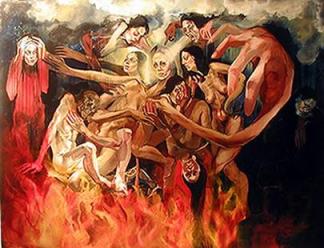The people of God heard the words
Moses brought to them from the Adonai and they were willing to listen and to take them at heart.
Without a willing mind, costly offerings would be abhorred. With it, the smallest will be accepted. Our hearts are willing, when we cheerfully assist in promoting the truth both by giving our money and our time and our labour. It is up to each individual to decide what he is going to do for God and how much time and money he or she is willing to invest in this God's work. The command, and its fulfilment, was not based on wealth. Nor was the
determination of the donation — be it of gold, fabrics or skills — based
on what the mind thought would be “appropriate” charity. It was based
on each person becoming aware of their spirit and their heart and acting
on that awareness. Thus anyone who attends to his work in the faith and fear of God, may be as wise, for his place, as anyone else, and be equally accepted of the Lord. Our wisdom and duty consist in giving God the glory and use of our talents, be they many or few:
"So whether you eat or drink or whatever you do, do it all for the glory of God" (1Corinthians 10:31).
Exo 35:20-29 MKJV And all the congregation of the sons of Israel departed from the presence of Moses. (21) And they came, every one whose heart stirred him up, and every one whom His spirit made willing. They brought Jehovah's offering to the work of the tabernacle of the congregation, and for all His service, and for the holy garments. (22) And the men came in together with the women, as many as were willing-hearted, bringing bracelets and earrings, and rings and ornaments, all jewels of gold. And everyone who offered waved a wave offering of gold to Jehovah. (23) And everyone with whom was found blue, and purple, and scarlet, and bleached linen, and goats' hair, and red skins of rams, and badgers' skins, brought them. (24) Everyone lifting up an offering of silver and bronze brought Jehovah's offering. And everyone with whom was found acacia-wood for any work of the service, brought it. (25) And every wise-hearted woman spun with her hands. And they brought spun yarn, blue, and purple, scarlet, and bleached linen. (26) And all the women whose hearts were lifted up in wisdom spun goats' hair. (27) And the rulers brought onyx stones, and stones to be set, for the ephod and for the breast-pocket. (28) And they brought spice and oil, for the light and for the anointing oil and for the sweet incense. (29) The sons of Israel brought a willing offering to Jehovah, every man and woman whose heart made them willing to bring for all kinds of work which Jehovah had commanded to be made by the hand of Moses.
The inhabitants of this world have to choose which world they want to belong to. Each person also has to chose on whose side he or she wants to stand and where to look for wisdom and truth. To come to wisdom and insight there has to be an open mind, willing to look further then the length of the nose and looking beyond the man made dogmas and teachings. That last part is the most difficult. Most people are afraid to set aside the dogmatic teachings, like the teaching of the
Holy Trinity.
Most often they want to silence themselves such a tri-une godhead is too difficult to understand for man so it shall only be understood when the Holy Spirit is on man.
As such many Christians keep blinding themselves, not willing to accept the words like they are written down in the Bible. They forget that God commanded each person to search for the truth and to seriously study His Word, being prepared to put aside man's word. Each person has to become aware of their spirit and their heart and acting
on that awareness, and God shall consider each person himself or herself responsible for the (man)made choices.
Rabbi Michael Barclay reminds us that in the past each gift was not judged by its financial value, but valued because it
was a gift of the heart, a unique expression of that person. According
to Rabbi Avraham Greenbaum:
“The various different physical materials
that different men and women had in their possession and contributed for
the construction of the Sanctuary correspond to the unique personal
attributes and powers possessed by each and every individual.
These days we look at the Book Exodus and at the
Book of Proverbs trying to see how God's Wisdom is given free to share with many and enabling to free our minds and souls. coming closer to 14 Nisan we remember the Exodus of God's People. With them we find the story of a journey into freedom, but with
freedom comes responsibilities.
We can not ignore how even the People of God once liberated form slavery by Him, dared to doubt Him and even went astray at several moments in their life. From the book Exodus we should hear the clear teaching:
Each individual must choose to give from the deepest part within
themselves in order to achieve God’s goals and obey God’s instructions.
There are no statements that one person’s gift is better than another’s,
just an instruction that the gifts must be heartfelt. {Building a community on individual effort}
When we look at what happened in Ancient Egypt and later in Jerusalem when the Nazarene Jew Jeshua offered himself as a lamb for the liberation of many,we can see the generosity of two people, one the Most High Divine creator, the Elohim Hashem Jehovah, and second His only begotten son, who is called son of man but also son of God.
That man only did what his heavenly Father wanted. He managed to keep doing the Wishes of the Most High. He told people he could do not anything without that God Who is much higher than him.
Joh 14:27-31 MKJV Peace I leave with you, My peace I give to you. Not as the world gives do I give to you. Let not your heart be troubled, neither let it be afraid. (28) You have heard how I said to you, I go away and I am coming to you again. If you loved Me, you would rejoice because I said, I go to the Father, for My Father is greater than I. (29) And now I have told you before it happens, so that when it happens you might believe. (30) I shall no longer speak many things with you, for the ruler of this world comes, and he has nothing in Me. (31) But that the world may know that I love the Father, and as the Father has given Me commandment, even so I do. Arise, let us go away from here.
Today there are still lots of Christians who do not want to believe the words of Christ Jesus and his heavenly Father, what they say about each other, but prefer to keep to the idea of a tri-une god.
They should come to understand that this Jew who said he can do nothing on his own initiative, but only what he sees the Father doing is the one promised in the Garden of Eden and the one who was tempted, though God can not be tempted, and really died, whilst God can not die.
It is that period of the last hours we are going to 'celebrate' these days and in particular next Friday and Saturday. We do believe that the Nazarene Jeshua, is the one provided by the Elohim to bring a solution against the curse of death. The son of man who is also the son of David and son of Abraham could do only the things he did because God allowed him to do it and gave him the power to do it. For those around Jeshua and for us it should be the sign that God the Father loves this son and shows him everything he does, and will show him greater deeds than these, so that we will be amazed.
We shall read the coming days in the books of the New Testament how Jesus prepared himself to the agony and death he was expecting. We also shall read how he ended up in hell for three days and afterwards was taken up from the dead by his heavenly Father, who made him higher than angels. In that action taken place some 1985 years ago we can see how God raises the dead and gives them life and how in the same manner now life has come over us who want to accept Jesus as the son of God.
We all should also be fully aware how God now has assigned all judgement to the Son, so that all people will honour the son just as they honour the Father. We also should know that the one who does not honour the son does not honour the Father who sent him.
Joh 5:18-27 MKJV Then, because of this, the Jews sought the more to
kill Him, because He not only had broken the sabbath, but also said that
God was His father, making Himself equal with God. (19) Then Jesus
answered and said to them, Truly, truly, I say to you, The Son can do
nothing of Himself but what He sees the Father do. For whatever things
He does, these also the Son does likewise. (20) For the Father loves
the Son and shows Him all the things that He Himself does. And He will
show Him greater works than these, so that you may marvel. (21) For as
the Father raises the dead and makes alive, even so the Son of Man
makes alive whomever He wills. (22) For the Father judges no man, but
has committed all judgment to the Son, (23) so that all should honor
the Son, even as they honor the Father. He who does not honor the Son
does not honor the Father who sent Him. (24) Truly, truly, I say to
you, He who hears My Word and believes on Him who sent Me has
everlasting life and shall not come into condemnation, but has passed
from death to life. (25) Truly, truly, I say to you, The hour is
coming and now is, when the dead shall hear the voice of the Son of God,
and they who hear shall live. (26) For as the Father has life in
Himself, so He has given to the Son to have life within Himself, (27)
and has given Him authority to execute judgment also, because He is the
Son of Man.
Jesus honoured his Father and honoured God His commandments, asking us to do likewise.
Our generosity, especially toward honouring God’s commands, must be determined by what our hearts say, not
our minds (which are often concerned with growing assets and eliminating
financial debts). All too often, we think about and even “want to”
donate something but hesitate because we are scared that ultimately we
will “not have enough.” Our minds, busy worrying about the future, often
get in the way of what our hearts know is truly righteous. {Building a community on individual effort}
We can hear the words of Jesus and prefer them to place them in the tri-une god dogmatic teaching or can place them like God wants us to see them in the light of the Only One Godship. Having to make the choice to stay popular by man or to become popular by God, honouring the right people in the right concept, worshipping only One True God.
The people who got guided out of Egypt also had to make the right choices and many of them had difficulties to worship the true God all the time. They who felt the Hand of Salvation by God, even had a moment they came to worship a golden calf.
We, in our generation have not felt the Hand of God like the Jews had felt it. This perhaps makes it more difficult for many to see that Hand of God. Though god has given His Word where in wisdom can be found. We only have to take it up and study it. Reading the words we should come to hear the words and then we shall have to make the right choices.
In reality, every choice is one between faith and fear, and while our
hearts may know that it is right to give of ourselves, our minds
sometimes get caught in that fear, and so we don’t follow the deeper
parts of ourselves. The teaching in our portion (Exodus 35:21) reminds us to follow our
hearts and to give fully … knowing in faith that we are in partnership
with God and that our well-being is always in God’s hands. {Building a community on individual effort}
Ben Azzai in Pirkei Avot 4:3 says:
“Do not regard anyone with contempt, and do not reject anything, for
there is no man who does not have his hour and nothing which does not
have its place.”
The portion, as well as the words of Ben Azzai, also reminds us to honour the honest gift of each person.
Wouldn’t it be nice if we all
judged each other with the same standards that God demonstrates in this
part of the Torah? If, rather than glorifying someone who gives a lot of
money to their temple and degrading someone who gives less — or worse,
trying to shame them into giving more — we chose to look at whether the
gift was a reflection of the person’s spirit and heart. If we valued the
volunteer who helps set up and take down services and does it from
their heart, as highly as we valued the financial donor? If we followed
this simple instruction of respecting and treasuring each person and
their individual gifts, how much more full would our communities be? {Building a community on individual effort}
The month Nisan is the first of the Judaic religious year and should also be our first month of the year were we think to start a new or make some good intentions again. It is a point were we should reconsider how we treated everybody last year and how we should treat everybody in the future.
How much more welcoming and healthy would our communities be if we
truly honoured each person for their own uniqueness, special qualities
and expressions? {Building a community on individual effort}
Freedom itself is a Divine gift. This week’s portion reminds us to
truly open our hearts and let our actions be a reflection of that
openness — to respect each individual for their unique gifts and to
embrace the results of more participation in all ways. {Building a community on individual effort}
Open hearts, action and true respect. Isn’t that what defines a healthy community?
May we all be blessed to build our own communities with the same
integrity and passion as our ancestors, and to reap the blessings God
provides as a result. {Building a community on individual effort}
Jesus asked us to become part of his body. With him we should all gather in unity trying to exhort each other and helping each-other to get more insight and wisdom.
++
Find also to read:
- Hearing words to accept
- Looking for wisdom not departing from God’s Word
- Increased in wisdom in favour with God
- Fools despise wisdom and instruction
- We may not be ignorant to get wisdom
+++





































